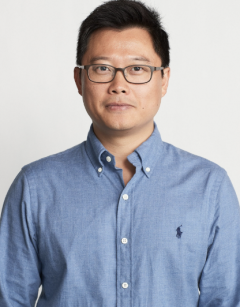
Session 2: Regulatory Landscape of Digital Trade
This panel shared academic, policy and commercial insights and experiences on latest developments of domestic, regional and global frameworks and initiatives for digital regulation and major implications for policymaking and business activities, particularly in and between Australia and China.
Speakers
Mr David Yardley is a senior career officer with the Australian Department of Foreign Affairs and Trade (DFAT) and is currently Assistant Secretary, Digital Trade and Multilateral Economic Cooperation Branch. Previously he was Australia’s High Commissioner to the Republic of Kiribati (2021-23) and, before that, Counsellor at Australia’s Mission to the United Nations, New York (2016-20). He earlier served in the Australian Embassy in Kabul, and on secondment in the UK Foreign and Commonwealth Office, London.
Mr Yardley holds a Master of Philosophy from the University of Cambridge; a Bachelor of Laws and a Bachelor of Science from the University of Sydney.
Henry Gao is a Senior Fellow at the Centre for International Governance Innovation and Professor of Law at Singapore Management University. He sits on the Advisory Board of the WTO Chairs Program and the editorial boards of the Journal of International Economic Law and Journal of Financial Regulation. Professor Gao is a CIBEL fellow and has engaged with CIBEL researchers and activities since the centre was established in 2015.
In addition to being a regular speaker or commentator in CIBEL events, Professor Gao has worked with CIBEL Co-Director Associate Professor Weihuan Zhou in a range of quality and impactful publications covering issues relating to the US-China trade war, China’s state capitalism, industrial policy and subsidies, the WTO’s Appellate Body crisis and solutions, China’s developing country status and request for joining the CPTPP, and the nexus between trade and sustainability focusing on China’s energy transition and climate action.
Xongshan Cai is Vice President of Kuaishou and Executive Dean of Kuaishou Research Institute. He was the director and Chief Researcher of Law Research Center, Tencent Research Institute. He is also research fellow of Oxford Global Society (OXGS). Mr Cai teaches the master’s course Cyber Law at Communication University of China.
Mr Cai holds master’s degrees in International Law from Transnational Law and Business University (TLBU), South Korea, and in European Union and International Economic Law from Université de Paris I (Panthéon-Sorbonne). He has also been a visiting scholar at Yale University.
Mr Cai has worked in the Policy and Economics Research Institute of CAICT (China Academy of Information and Communications Technology), Ministry of Industry and Information Technology. He has served as the negotiator of the Chinese government for the China-Switzerland Free Trade Zone Negotiation and one of the Chinese experts for the China-Europe Digital Economy Expert Dialogue.
Jack Lu is a Global Engagement Manager of Australian Trade and Investment Commission. Jack has over 15 years of experience in cross border eCommerce.
Jack has been helping Australian businesses in all sizes to explore opportunities globally. His recent role focuses on the food and beverage, health supplement and beauty and skincare sectors. He has also worked closely with international eCommerce platforms such as Alibaba, Tencent and Amazon to deliver programs and opportunities to Australian exporters.
Chair
Weihuan Zhou is Associate Professor and Co-Director of the China International Business and Economic Law (CIBEL) Centre at the Faculty of Law & Justice, University of New South Wales (UNSW) Sydney. His research explores cutting-edge issues in the field of international economic law, particularly the nexus between international trade law and China. His publications are cited widely, including in reports of the European Parliament, the Parliament of Australia, US Congressional Research Services and World Economic Forum. He is formerly co-Secretary and currently executive council member of the Society of International Economic Law (SIEL). He sits on the editorial boards of the World Trade Review, the Journal of International Trade Law and Policy and the Journal of WTO and China.
About CIBEL-NFACR Conference
Australia China Business in the Digital Age: Navigating the Rapids
The digital environment has radically changed the way that global supply chains operate. This conference brings together experts and business operators from Australia and China to discuss frameworks, developments and pain points with the aim of enabling businesses in Australia and China to deal more confidently with their counterparts overseas. It also aims to facilitate further collaboration and opportunities. It focuses on four important areas: competition law, which applies to businesses but has had particular impact on digital players; trade law, which sets many of the rules of engagement for global business; digital finance, an important and essential element of trade and commerce; and dispute resolution, which focuses on what to do when the deal goes wrong.
Acknowledgement
The ‘Competition Law in the Digital Age: Enhancing Australian and Chinese Business Understanding' project is supported by the National Foundation for Australia-China Relations. UNSW CIBEL is proud to be a National Foundation for Australia-China Relations grant recipient.





